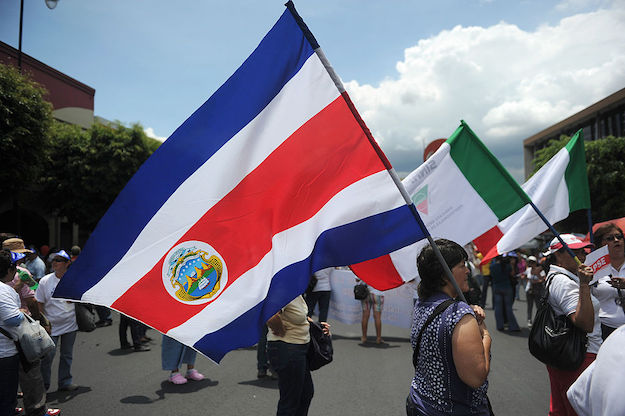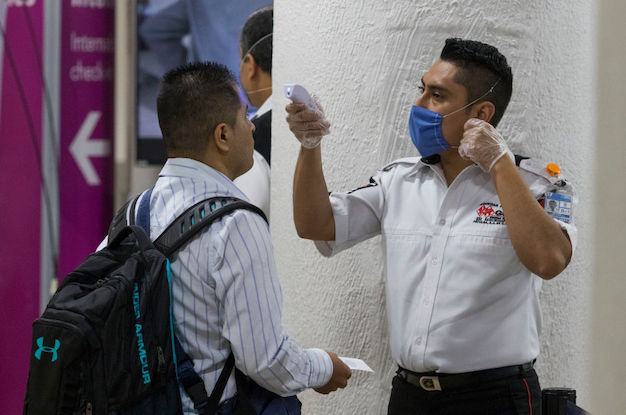Attorney General Emilia Navas calls it a “before and after” moment in Costa Rican politics.
In 2017, audio recordings of a conversation between building developer Juan Carlos Bolaños and Guillermo Quesada, a Central Bank deputy, lifted the curtain on an apparent corruption scheme involving business interests and public officials from every branch of government.
At the core of the scandal was Bolaños’ effort to import cement from China to undercut Cemex and Holcim, two multinationals with a hold on the Costa Rican market. Officials allegedly changed import rules in Bolaños’ favor to enable the deal, and public banks gave him more than $30 million in questionable loans for the purchase.
The scandal, known as the “cementazo,” led to additional investigations and the removal from office of a Supreme Court judge, Navas’ predecessor as attorney general, officials at the Central Bank and a member of Congress.
But so far, none of the key figures in the case have been convicted of a crime. Bolaños maintains his innocence, and is under house arrest while investigations against him continue. Whether the cementazo will mark a true turning point in Costa Rica’s fight against corruption remains to be seen.
“The public has a very high opinion of the attorney general, but such high expectations can be dangerous,” said Kevin Casas Zamora, an associate researcher at the Inter-American Dialogue. “It’s too early to tell what effect the cementazo will have on the institutions involved in Costa Rica’s corruption fight.”
In an interview with AQ, Navas acknowledged the challenges of prosecuting a case of the size and complexity of the cementazo, especially when former members of the judiciary had been implicated.
“We have to try to restore confidence in the justice system,” Navas said. “The most valuable thing we have at our disposal right now is transparency and accountability to the public, to the media and to everyone else.”
To that effect, Navas’ office has taken uncommon steps to keep Costa Ricans informed about ongoing investigations. In January she became the country’s first attorney general to offer an annual report on her office’s activities to the public.
Meanwhile, the list of public officials implicated in the cementazo continues to grow – on July 18, Navas confirmed that her office had opened an investigation into former President Luis Guillermo Solís over his alleged involvement in the case.
But Navas said her office still lacked some of the tools it needed to fully investigate corruption networks like the one uncovered in 2017. That includes a sufficient pool of prosecutors with specific knowledge of anti-corruption practices, Navas said.
In March, Navas’ office petitioned the Supreme Court to authorize the creation of a special unit to train and employ prosecutors to fight corruption. The Court approved the petition, and the new unit will come into force later this month, though concerns persist over whether it will be given the support and funding it needs to work as envisioned.
“(President Carlos Alvarado) has said that he cares deeply about the case, and that corruption is a priority,” Navas said. “So far the reaction has been good, but we need to see if that translates when it comes time to make decisions.”
As in Brazil, where members of the judiciary have been accused of cutting corners – and worse – in prosecuting the Lava Jato corruption scandal, Navas said she was cognizant of the risks of overreach inherent in a case of the size and scope of the cementazo.
She also said she understood how her role leading the high-profile investigation made her a target for criticism.
In July, a former presidential candidate, after hearing that Navas’ office planned to investigate him, published a video on Facebook saying he “dares (Navas) to commit one more injustice against me.”
“It’s understandable that people don’t want to be investigated, and generally speaking these are people with economic power and political influence,” Navas said. “The hard part of it is that these are daily attacks, attacks on us personally and professionally.”
Much of the criticism of Navas’ work as attorney general has indeed hit close to home. Navas’ husband is a prominent lawyer in Costa Rica and critics often claim her relationship as proof that she is too close to some of the circles of power she’s meant to be investigating.
Navas denies that she has been anything but impartial as Costa Rica’s top prosecutor, and notes that when necessary she has stepped away from cases to avoid the appearance of conflict of interest. In May, she recused herself from an investigation into Aldesa, a financial brokerage, because her husband serves as counsel to the firm’s director.
The stakes of the cementazo investigation are high, both for Navas and for Costa Rica. “Absolute transparency,” Navas said, will be key to both avoiding missteps and maintaining public support.
“This type of network of corruption may have been unprecedented in Costa Rica, but so was the demand from the public for justice,” Navas said. “Before, there wasn’t such interest in pursuing and denouncing acts of corruption, but in this case public pressure has made a huge difference.”
—
Russell is a senior editor for AQ. Follow him on Twitter @BenPaulRussell






